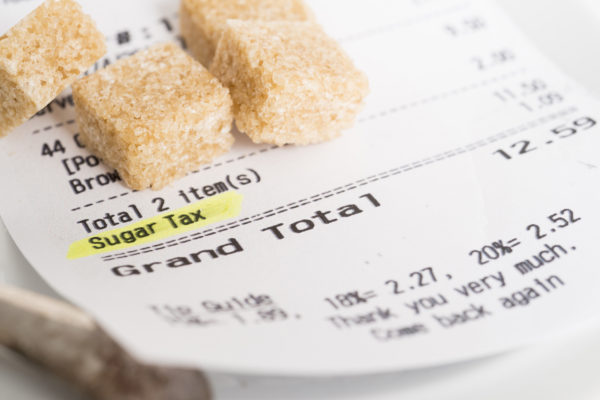

DEPENDING ON WHO you ask, answers to this question may range from “don’t know, don’t care” to “it’s the Nanny State gone mad” or “it’s a step in the right direction”. I fall into the latter camp.
Those who cry “Nanny State” argue that drinking a litre of cola isn’t going to increase your chances of having an accident when driving a car or operating machinery, or lose your inhibitions and engage in risky behaviour. So why should the government try to regulate the level of non-alcoholic beverages people choose to consume?
Others believe that it is a parent’s responsibility to educate their children about what is healthy and what is not so healthy. And if parents won’t, teachers should.
Over 400 calories
The reality is that a litre bottle of cola or a similar sugar sweetened drink is equivalent to over 400 calories – that’s one-fifth (20%) of the daily recommended calorie intake for an inactive adult.
Sugar sweetened drink calories are empty calories to boot; they won’t fill you up or quench thirst for long. They are also well over the recommendation that added sugar should contribute less than 10% (ideally 5%) to daily energy intake. Add to this that most of the time we consume sugary drinks in addition to our daily food intake, they will inevitably over time lead to added pounds and a sense that clothes sizes are shrinking.
Unfortunately, our good intentions are not enough to burn 400 calories – that requires at least 30 minutes of brisk walking in addition to being active enough throughout the day to achieve 10,000 steps. And despite what we might think (or our fondness for ath-leisure wear) the evidence is that only one in three of us are sufficiently active every day.
So what difference will the Sugar Sweetened Drinks Tax make when it comes into effect?
Will you notice it at the till? Probably not. How much attention do you pay to the individual price of products in your shopping basket? Depending on the level of added sugar, it may mean a 10c price increase on 330ml can, or 60c on a 2 litre bottle of cola.
Unlike the plastic bag levy, you won’t have to choose to pay at the till or change your behaviour. The tax is cleverly designed to push this choice onto the producer. A number of other countries, such as Mexico and France among others, have lead the charge and made an impact in terms of reduced consumption and sales.
The global industry is very sensitive to these kinds of trends, and even before Ireland’s sugar tax has been fully introduced, it seems to be having an effect. I have noticed, and hope to see more of, producers reformulating their products, providing consumers with options that have less added sugar, or offering products in smaller portion sizes.
I’m also a parent
I might work in the Healthy Eating and Active Living Programme, but I’m also a parent, and I’m not immune to the never-ending debate with kids on what we eat and drink as a family.
Every trip to the supermarket involves an attempt to sway the choices. I’ve eventually realised that the only way is to stick to my guns and be firm. No means no, no matter how persuasive their argument. Occasional treats are occasional treats. They have to make the choices within the boundaries I set.
At least when we have lower sugar options, we have more choices. But at the end of the day, these drinks are taxed because of the negative effect they have on health – whether it is weight gain with its associated health risks, or dental health. The simple message is they are not good for your health, you don’t need them and you shouldn’t have them more than once or twice a week at the most. Water and milk are perfectly fine for every day.
A step in the right direction
The sugar tax is a definite step in the right direction. By us talking about it, it is increasing our awareness of the health impacts of the food and drinks so readily available to us, and the choices we make for ourselves and for our families. Equally importantly, it is a wake-up call to our food and drinks industry to recognise the role they must play in protecting the health of their consumers.
So what difference will the sugar tax make? It is a clear signal that when it comes to tackling the high levels of overweight and obesity in our children and young people. Ireland is getting serious now.
Sarah O’Brien is National Lead of the HSE’s Healthy Eating and Active Living Programme.
more recommended stories
 Fentanyl Seizures at Border Continue to Spike, Making San Diego a National Epicenter for Fentanyl Trafficking
Fentanyl Seizures at Border Continue to Spike, Making San Diego a National Epicenter for Fentanyl TraffickingFentanyl Seizures at Border Continue to.
 Utah Man Sentenced for Hate Crime Attack of Three Men
Utah Man Sentenced for Hate Crime Attack of Three MenTuesday, August 8, 2023 A.
 Green Energy Company Biden Hosted At White House Files For Bankruptcy
Green Energy Company Biden Hosted At White House Files For BankruptcyAug 7 (Reuters) – Electric-vehicle parts.
 Former ABC News Reporter Who “Debunked” Pizzagate Pleads Guilty of Possessing Child pδrn
Former ABC News Reporter Who “Debunked” Pizzagate Pleads Guilty of Possessing Child pδrnFriday, July 21, 2023 A former.
 Six Harvard Medical School and an Arkansas mortuary Charged With Trafficking In Stolen Human Remains
Six Harvard Medical School and an Arkansas mortuary Charged With Trafficking In Stolen Human RemainsSCRANTON – The United States.
 Over 300 People Facing Federal Charges For Crimes Committed During Nationwide Demonstrations
Over 300 People Facing Federal Charges For Crimes Committed During Nationwide DemonstrationsThe Department of Justice announced that.
